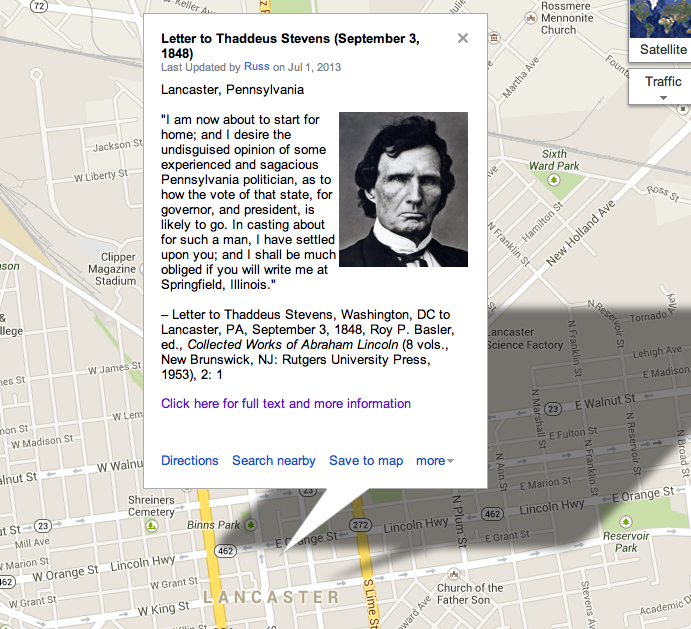Contributing Editors for this page include Annemarie Gray
Ranking
#139 on the list of 150 Most Teachable Lincoln Documents
Annotated Transcript
On This Date
HD Daily Report, September 3, 1848
The Lincoln Log, September 3, 1848
Close Readings
Posted at YouTube by “Understanding Lincoln” participant Annemarie Gray, November 15, 2013
Custom Map
How Historians Interpret
“On his return to Washington, Lincoln stopped in Wilmington, Delaware, to attend a local Whig meeting held to ratify the convention’s choice, where he was introduced as the ‘Lone Star of Illinois,’ and given three cheers. Undoubtedly, he invented the nickname himself, adapting it from Clay, known as the ‘Star of the West’ early in his career. (In a letter sent in September to an influential lawyer among the Whigs of Pennsylvania that year for the house, Thaddeus Stevens, later to become the Radical Republican leader, Lincoln wrote, ‘You probably remember seeing me at the Philadelphia Convention—introduced to you as the lone Whig star of Illinois.’) Lincoln’s speech, as reported by the Wilmington newspaper, roundly assailed Polk for his ‘abuse of power,’ the ‘high-handed and despotic exercise of the veto power’ against internal improvements, and for waging ‘a war of conquest brought into existence to catch votes.’”
—Sidney Blumenthal, A Self Made Man: The Political Life of Abraham Lincoln Vol. 1, 1809-1849 (New York: Simon and Schuster, 2016), 384.
“After he entered Congress himself in the late 1840s, Lincoln quickly cast his eyes beyond the doubtful districts of Western Illinois. He took it upon himself, for example, to contact former Whig legislator Thaddeus Stevens during the 1848 presidential campaign in an effort to obtain soundings from the state of Pennsylvania. ‘You may possibly remember seeing me at the Philadelphia convention,’ Lincoln began, reminding him that he was ‘the lone whig star of Illinois.’ Reporting that he was about to leave the nation’s capital, Lincoln stated that he desired ‘the undisguised opinion of some experienced and sagacious Pennsylvania politician, as to how the vote of that state, for governor, and president, is likely to go,’ asking that Stevens send such opinions by mail to him in Springfield.”
—Matthew Pinsker, “Lincoln and the Lessons of Party Leadership” in Lincoln and Liberty: Wisdom for the Ages, Ed. Lucas E. Morel (Lexington: University Press of Kentucky, 2014), 194.
NOTE TO READERS
This page is under construction and will be developed further by students in the new “Understanding Lincoln” online course sponsored by the House Divided Project at Dickinson College and the Gilder Lehrman Institute of American History. To find out more about the course and to see some of our videotaped class sessions, including virtual field trips to Ford’s Theatre and Gettysburg, please visit our Livestream page at http://new.livestream.com/gilderlehrman/lincoln
Searchable Text
Hon: Thaddeus Stevens Washington,
Dear Sir: Sept. 3. 1848
You may possibly remember seeing me at the Philadelphia Convention—introduced to you as the lone whig star of Illinois. Since the adjournment, I have remained here, so long, in the Whig document room. I am now about to start for home; and I desire the undisguised opinion of some experienced and sagacious Pennsylvania politician, as to how the vote of that state, for governor, and president, is likely to go. In casting about for such a man, I have settled upon you; and I shall be much obliged if you will write me at Springfield, Illinois.
The news we are receiving here now, by letters from all quarters is steadily on the rise; we have none lately of a discouraging character. This is the sum, without giving particulars. Yours truly
A Lincoln

